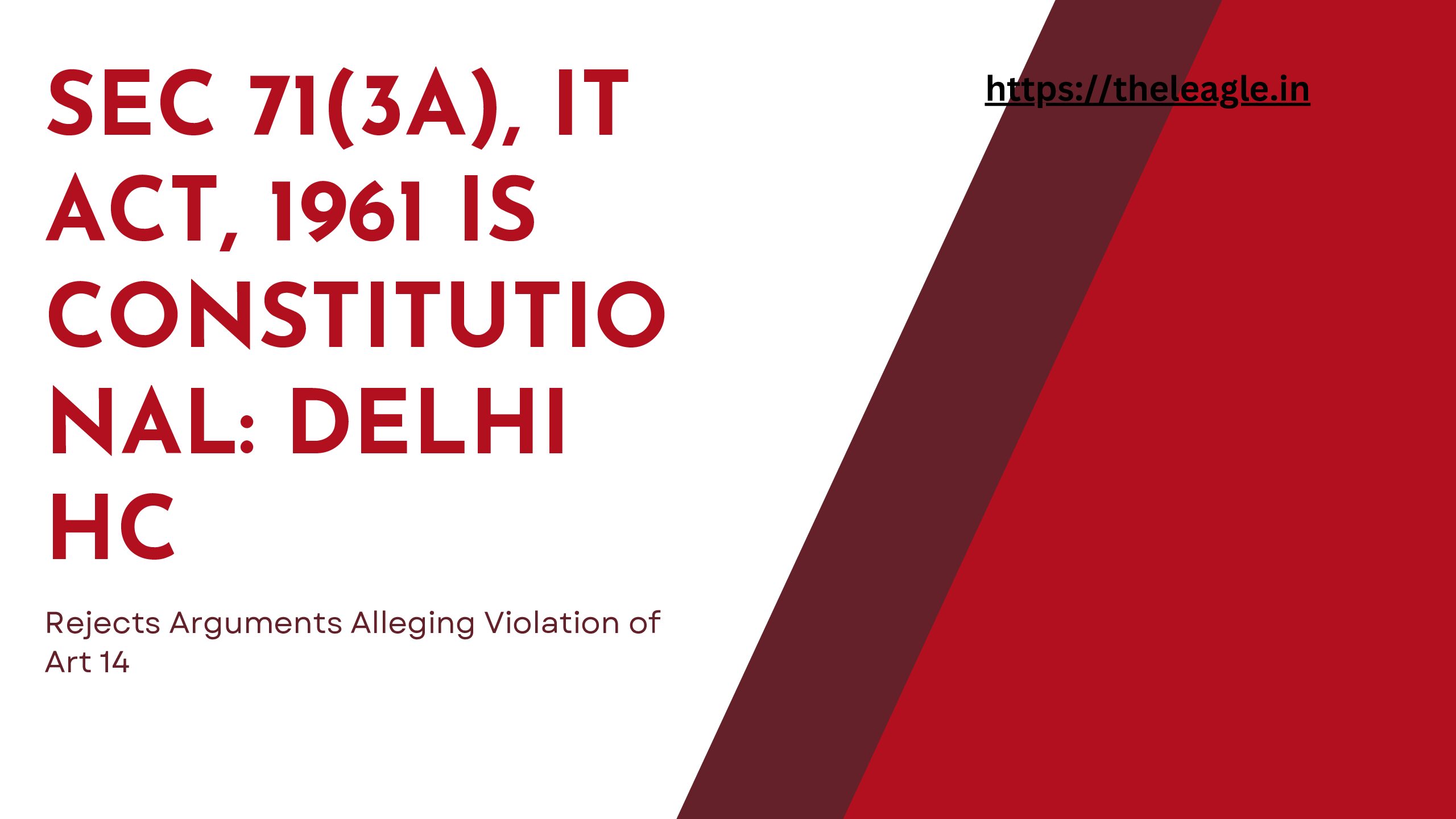In a recent judgment, the Delhi High Court held that Section 71(3A), IT Act, 1961 was constitutional and did not violate Art 14 and/or Art 19(1)(g) of the Constitution. The High Court’s primary reasoning was that the introduction of sub-section (3A) to Section 71 did not take away a vested right of the assessee but only introduced a new condition for an assessee to set off the loss.
Section 71, IT Act, 1961
Section 71(1), IT Act, 1961 allows an assessee to set off loss under one head of income against income under another head of income, subject to certain conditions. To the said conditions, Finance Act, 2017 added another condition by introducing a new sub-section (3A) which states that:
Notwithstanding anything contained in sub-section (1) or sub-section (2), where in respect of any assessment year, the net result of the computation under the head “Income from house property” is a loss and the assessee has income assessable under any other head of income, the assessee shall not be entitled set off such loss, to the extent the amount of the loss exceeds two lakh rupees, against income under the other head. (emphasis added)
The condition of claiming a set off of loss, not beyond two lakh rupees was challenged by the assessee before the Delhi High Court.
Assessee’s Challenge
The asssesee made the following main arguments in its attempt to assail the constitutional validity of Section 71(3A), IT Act, 1961: first, that that prior to the amendment assessee had an unhindered right to claim set of loss and promissory estoppel should be applied against the State since introduction of Section 71(3A) amounted to breach of a promise; second, the assessee claimed that the impugned sub-section created unreasonable restrictions on taxpayer rights and was violative of Art 14 and Art 19(1)(g) of the Constitution.
The State’s arguments, in short, were that the Section 71(3A) was not a revenue harvesting measure but an anti-abuse provision. In the absence of an upper limit, high income taxpayers were paying huge amount as interest payments and setting off the same against incomes from other heads.
High Court’s Analysis
The Delhi High Court noted that as per the facts: when the assessee constructed his house in 2014, he was entitled to claim deductions – without an upper limit – on interest payments made for housing loan; but, from Assessment Year 2018-19, the deductions were limited to a maximum of Rs 2 lakhs. The introduction of the upper limit was challenged by the assessee as an unreasonable restriction on taxpayer rights.
The Delhi High Court noted that assessee’s challenge to Section 71(3A) was founded on the impugned sub-section having a retroactive effect, i.e., applicability of a law/provision to a fact situation where assessee has vested rights. And a successful challenge to retrospectivity was only possible if a vested right of the assessee was disturbed by introduction of the impugned sub-section. The High Court noted that neither the previous nor the amended provision created an indefeasible right in the petitioner’s favor to set off the losses. (para 24)
In the absence of a crystallised right, the Delhi High Court added, the assessee’s argument that impugned sub-section violates Article 14 does not hold water. The High Court’s reasoning was that the impugned sub-section does not take away the right of assessee to set off losses in toto, but only circumscribes it and imposes conditions. And further, a new class of taxpayers has not been created by the impugned provisions but only new conditions have been imposed on an existing class of taxpayers. Further, the State has provided a clear rationale for imposing the conditions, i.e., to prevent misuse of the provision by high-income taxpayers. Thus, the High Court concluded that the criteria of reasonable classification and intelligible differentia were met by the impugned sub-section and it was not violative of Article 14. The High Court added that the provision was not manifestly arbitrary either. Finally, the High Court also rejected the assessee’s challenge vis-à-vis Article 19(1)(g) and noted that the restriction was proportional and reasonable and not in violation of the assessee’s right to do business.
Conclusion
The assessee’s case that a vested right has been taken away by a retroactive amendment to Section 71 did not have much traction to begin with. The legislature has the discretion to limit the tax benefits, in this case, the deductions were restricted to a certain amount to prevent certain high-income taxpayers from misusing the provision. While the introduction of said limit also affected taxpayers such as the assessee in this case, it was still not a right of the assessee to claim such a deduction. The mere fact that the assessee could claim the deduction without any limit from 2014 until 2018, was not enough for it to claim a vested right for such deductions. And the Delhi High Court correctly dismissed the claim of violation of Article 14 and Art 19(1)(g) of the Constitution.
